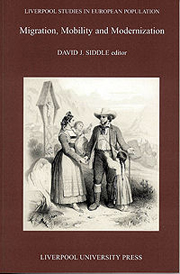Book contents
- Frontmatter
- Contents
- List of Figures
- List of Tables
- 1 Introduction
- 2 Nephews, Dowries, Sons and Mothers: the Geography of Farm and Marital Transactions in Eastern Ireland, c. 1820–c.1970
- 3 Mobility, Kinship and Commerce in the Alps, 1500–1800
- 4 People from the Pits: the Origins of Colliers in Eighteenth-Century South-West Lancashire
- 5 Motives to Move: Reconstructing Individual Migration Histories in early Eighteenth-Century Liverpool
- 6 Urban Population and Female Labour: the Fortunes of Women Workers in Rheims before the Industrial Revolution
- 7 Mobility Among Women in Nineteenth-Century Dublin
- 8 Tramping Artisans in Nineteenth-Century Vienna
- 9 Migration and Urbanization in North-West England: a Reassessment of the Role of Towns in the Migration Process
- Index
1 - Introduction
- Frontmatter
- Contents
- List of Figures
- List of Tables
- 1 Introduction
- 2 Nephews, Dowries, Sons and Mothers: the Geography of Farm and Marital Transactions in Eastern Ireland, c. 1820–c.1970
- 3 Mobility, Kinship and Commerce in the Alps, 1500–1800
- 4 People from the Pits: the Origins of Colliers in Eighteenth-Century South-West Lancashire
- 5 Motives to Move: Reconstructing Individual Migration Histories in early Eighteenth-Century Liverpool
- 6 Urban Population and Female Labour: the Fortunes of Women Workers in Rheims before the Industrial Revolution
- 7 Mobility Among Women in Nineteenth-Century Dublin
- 8 Tramping Artisans in Nineteenth-Century Vienna
- 9 Migration and Urbanization in North-West England: a Reassessment of the Role of Towns in the Migration Process
- Index
Summary
For over a century, scholars who studied migration concentrated on the identification of laws to explain the processes by which towns and cities attracted people to them. In the main they successfully demonstrated how the movement of people in the mass reflected a set of scientific principles concerning gravitation and distance. But since the 1950s, demographic historians and geographers have increasingly remembered that the experience of population mobility is also one which involves decision making and that a proper understanding of migration must involve the behaviour of individuals as well as aggregates. This scholarly rite of passage was probably necessary and may have been unavoidable. Indeed, the introduction to this book is centred on the proposition that early students of migration were not only driven by a common urge to find underlying scientific principles to explain human activity but were also reflecting a culture which was traumatized by the whole experience of urban industrialization which set the main tide of migrants in motion. It can be confidently claimed that, until quite recently, the ethos of the study of migration has been deeply conditioned by this whole raft of experiences. In other words, it was itself the product of the traumatic experience of urbanization and economic expansion.
Migration was not, of course, a new phenomenon. Among traders and craftsmen it was a well-established feature of medieval and Renaissance Europe. But as societies moved towards the modern period, these movements gathered momentum.
Information
- Type
- Chapter
- Information
- Migration, Mobility and Modernization , pp. 1 - 8Publisher: Liverpool University PressPrint publication year: 2000
Accessibility standard: Unknown
Why this information is here
This section outlines the accessibility features of this content - including support for screen readers, full keyboard navigation and high-contrast display options. This may not be relevant for you.Accessibility Information
- 1
- Cited by
